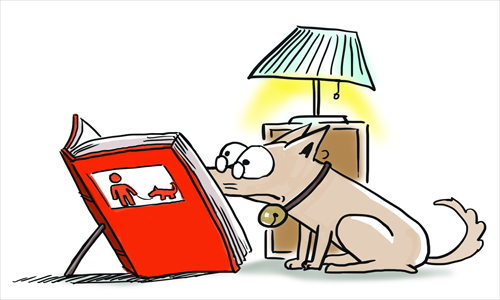HOME >> OP-ED
Good urban planning needs doggy touch
By James Palmer Source:Global Times Published: 2015-1-28 21:53:08

Illustration: Liu Rui/GT
The doggy politics of my hutong neighborhood in downtown Beijing are complicated. My two hounds are only part of an intricate network of diplomatic alliances, rivalries, and butt-sniffing inquiries. With dozens of dogs packed into a few hundred square meters, taking them for a walk requires remembering which other beasts they regard as friends, which they will bark at indifferently, and which will spark a full on brawl if not dragged away on the lead. I've seen mass doggy battles break out at the crossroads as a scuffle between two dogs draws in others until a half-dozen are contending in something halfway between a fight and a game.
But more of a concern for the human residents of the neighborhood, especially those who aren't dog owners, is the poop. When I first landed in China, dogs were relatively unusual. Now every local granny has a small and grumpy pup to keep them company, and every fashionable young woman a pampered and primped bichon frise. Beijing's dog numbers have exploded over the last decade.
Dogs were once banned in Beijing, but now, according to the authorities, there are over a million registered in Beijing, and the number are growing by 10 percent a year. Since many owners don't register their pets, the real amount may be closer to 2 or 3 million.
Dogs are lovable creatures, but they need to go to the toilet a lot. Like babies, it sometimes seems implausible that such small animals can produce such huge volumes of poop.
In the West, dog owners have been socialized by decades of training, injunctions and steep fines to pick up after their pets. The fine for not cleaning up in many US cities is a steep $250, enough to make even the most finicky owner grit their teeth, wrap their fingers, and reluctantly remove their pet's leavings.
I try to be a conscientious owner here. But I admit that sometimes, if one of the dogs goes discreetly in a corner, I let nature take its course with the results, especially in winter. It's not just picking up the poop itself that bothers me, but the subsequent search for somewhere to deposit the result. In Western cities, there are usually clearly marked bins for disposing dog poop. Here, I have to throw it in with the regular trash, leaving some poor garbage recycler to make an unpleasant discovery later.
There's also a dire lack of access to parks for dog owners in Beijing. Pups are forbidden from almost all public parks, out of fear of uncivilized owners letting poop stray wild.
But opening up parks to dogs would not only make them happier places, but also corral the poop problem by giving owners a teaching space to learn to pick up.
It's not the pets that need training here so much as it is their humans. As Matthew Gilbert points out in his book Off the Leash, dog parks in the West play a major role in teaching good habits, not only through imitating other owners but also through the supervisory presence of park officials.
Dog parks would also help teach local owners training habits, like keeping dogs on leash when not in designated spaces. Many owners here seem reluctant to leash their pets, which not only makes the cynophobic nervous but also seriously raises the rate of fights and other problems. Giving people clear spaces where they can unleash their dogs happily trains them to keep them on leash when it isn't appropriate.
It may seem silly to remake spaces for dogs when Beijing is straining under the number of its human inhabitants. But companion animals are a vital part of life for many people, and they cut across class and wealth boundaries. I know millionaires and migrant families that both own and love dogs. In a country where the barriers of wealth are increasingly dividing urban neighborhoods, shared canine-human spaces allow people to come together, whoever they are.
Creating the proper spaces for pet ownership inside the cities makes peoples' lives better, cleaner, and happier.
The author is an editor with the Global Times. jamespalmer@globaltimes.com.cn
Posted in: Viewpoint